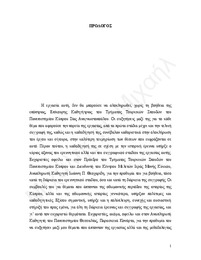Η διαδικασία συγκρότησης ενός θεσμού εξουσίας: Εκκλησία της Κύπρου, 1754-1910

Date
2003Author
Μιχαήλ, Μιχάλης Ν.Advisor
Αναγνωστοπούλου, ΣίαPublisher
Πανεπιστήμιο Κύπρου, Σχολή Ανθρωπιστικών Επιστημών / University of Cyprus, Faculty of HumanitiesPlace of publication
ΚύπροςGoogle Scholar check
Keyword(s):
Metadata
Show full item recordAbstract
The role of the Church of Cyprus during the critical period of the 19th century until 1910 is the main topic of this dissertation. Partially, an attempt is made to study the relationship between the Church and the Ottoman Administration, in parallel with the Ottoman Empire’s route to decay – decay clearly distinguishable in the 19th century – and mainly the progress of the Church of Cyprus within the new scenery as it is shaped in the internal political space of the Empire. The changes marked in the relationship of the Church of Cyprus with the political power after the transfer of Cyprus to the British Administration is another topic, the development of which, is studied through ecclesiastical and another records. The fields in which the study of the subject has been focused, are the following:
- The financial power of the ecclesiastical institutions of Cyprus – which increases as long as the Ottoman Empires decays – is an element leading to further desire for liberation of the Church leaders from the local Ottoman Administration. At the same time, this financial power – the Church is shown as the most significant land and capital owner on the island in the 18th and 19th centuries – leads to its domination over the social and commercial life of the country, to a large dependence of the orthodox population on the financial activities of ecclesiastical institutions and finally to making the Church the leading factor which will undertake the management not only of the financial but also of the political affairs of the island as well. That is to say, the Church has political power and a role in the Ottoman state because it has the potential for financial power. However the information of the 19th century, and the political power the Church already has, increases its political role in the Ottoman state, while an interdependence between the Church’s highest clergy and the Ottoman officials starts. The Church and the Ottoman Administration become indispensable to each other, operating within the framework shaped by the already distinguishable changes in traditional Ottoman institutions.
In the framework of capital ownership research – land and property – by the ecclesiastical institutions of Cyprus during the Ottoman period, income sources of these institutions are recorded and the involvement of Church structure – Archbishopric, Dioceses, monasteries – in the ottoman tax system is studied. This involvement inevitably provides the Church hierarchy with an important political role, not only for its followers but also for the Ottoman Administration itself since in this way the Church becomes necessary for the function of the public service.
- Through studying records and bibliography on Cyprus of the 19th century, it seems that in parallel with ecclesiastical institutions, rich people, not belonging to the Church, begin to distinguish themselves owning remarkable land and capital. Beyond this fact and its significance – considering the importance of capital ownership in the above mentioned period – this study attempts to record the relationships of this non-ecclesiastical element with the hierarchy of the Church of Cyprus. (...)
